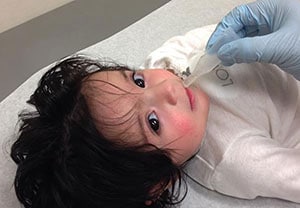Key points
- There are two rotavirus vaccines approved for use in infants in the United States; both are safe and effective.
- Infants should get 2 or 3 doses of rotavirus vaccine, depending on the brand of vaccine used.

Introduction
Rotavirus disease among infants and young children has decreased significantly in the United States since vaccine introduction. Each year, the vaccine prevents an estimated 40,000 to 50,000 hospitalizations among U.S. infants and young children. Rotavirus illness has also decreased among older children and adults that are not vaccinated. Vaccinated children provide indirect protection to other people because they are less likely to get and spread the disease.
This page summarizes CDC's current rotavirus vaccine recommendations. Access the official, full text below:
Rotavirus vaccine effectiveness
During an infant's first year, rotavirus vaccine provides:
- 85% to 98% protection against severe rotavirus illness and hospitalization.
- 74% to 87% protection against rotavirus illness of any severity.
Routine recommendations
There are two rotavirus vaccines approved for use in infants in the Unites States that are safe and effective. CDC recommends routine vaccination of infants with either of the two available vaccines:
The vaccines differ in how they are made and the number of doses, but both are given orally. Both vaccines are given by putting drops in the child’s mouth.
The first dose of either vaccine should be given before a child is 15 weeks of age. Children should receive all doses of rotavirus vaccine before they turn 8 months old.
Contraindications and precautions
Contraindications and precautions to vaccination generally dictate circumstances when vaccines will not be given.
- General Guidelines for Contraindications & Precautions
- Rotavirus Vaccine Contraindications & Precautions
Who shouldn't get the vaccine
You should not give rotavirus vaccine to babies with:
- A severe allergic reaction to a previous dose of rotavirus vaccine
- A severe allergy to any component of rotavirus vaccine
- Severe combined immunodeficiency
- A previous episode of intussusception
Babies who are moderately or severely ill should wait until they recover. This includes babies with moderate or severe diarrhea or vomiting.
Who may get the vaccine
Babies who are mildly ill can get the vaccine.
You may consider vaccinating babies with weakened immune systems due to:
- HIV/AIDS, or any other disease that affects the immune system
- Treatment with drugs such as steroids
- Cancer, or cancer treatment with x-rays or drugs
Conditions commonly misperceived as contraindications for rotavirus vaccine include:
- Prematurity
- Household members who are immunosuppressed
- Household members who are pregnant
Resources
- Rotavirus Vaccine Safety
- Rotavirus Vaccine Information Statement
- Vaccines Web-based Training Course
- Immunization schedules (Child and adolescent | Adult)
- Vaccines For Children Program Information for Providers
- Standing Orders: Rotavirus Vaccine for Infants | Immunize.org
- Ask The Experts: Rotavirus | Immunize.org
Clinical information
